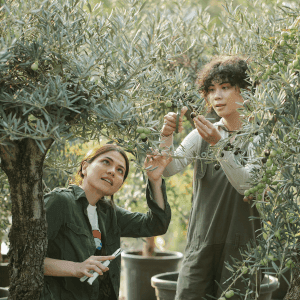The classification of virgin olive oil, the highest grade of virgin oils, is based both on physical-chemical analysis and a thorough organoleptic evaluation. The official tasting process for virgin olive oil is divided into two main phases: the olfactory examination and the gustatory-olfactory examination. Through these stages, it is possible to detect any defects in the oil and classify it at a commercial level.
No visual examination is performed since the color may influence the judgment. Therefore, a cobalt blue glass, covered with a glass lid, is used, and the oil is brought to a temperature of around 28 degrees Celsius. By rotating the glass, the oil coats the entire inner surface, enhancing the release of its aromas. After removing the lid, a deep inhalation is taken, and the glass is immediately covered again to preserve the aromas. This allows our brain to receive as much olfactory information as possible through the nose.
Following the olfactory examination, which lasts about 30 seconds, we proceed to the gustatory-olfactory phase. A small amount of oil, about 3 ml, is introduced into the mouth and spread across the entire oral cavity to engage all taste receptors. This allows us to perceive the bitterness and spiciness sensations. Then, the stripping technique is performed, which involves a series of short inhalations through the teeth to introduce air into the mouth, bringing out the volatile aromatic compounds, even through retro-nasal exhalation. The tongue, functioning like a laboratory, perceives tastes in specific areas: sweetness at the tip, bitterness at the back, and acidity and saltiness on the sides, providing a complete assessment of the oil’s taste profile.
The Taste Characteristics of Tuscan Oils


The tasting process for a high-quality Tuscan oil, renowned worldwide for its complexity of flavors and aromas, follows a precise method:
- Pouring and Warming: Based on the above, it is recommended to pour the oil into a small blue glass to avoid being influenced by its color. Warming the glass with your hands helps release the aromas.
- Smelling: During the olfactory examination, one seeks fruity aromas (both green and ripe), vegetal notes (such as freshly cut grass or tomato), or spicy tones. Tuscan oils often display scents of herbs, artichoke, and occasionally, tomato notes.
- Tasting: As the oil enters the mouth, various sensations can be distinguished:
- Acidity and Bitterness: Acidity is perceived on the sides of the tongue, while bitterness is felt at the back. Tuscan oils are particularly known for their slightly bitter and robust profile, thanks to local olive varieties like Frantoio.
- Spiciness: The pungent sensation, similar to pepper, is due to polyphenols such as oleocanthal. This spiciness is felt in the throat, and a good Tuscan oil may induce a slight cough, a sign of quality and richness in antioxidants.
- Palate: Different areas of the mouth perceive flavors in distinct ways. Sweetness is detected at the tip of the tongue, bitterness on the sides, and spiciness in the throat. This differentiation helps to identify the complexity of an oil and assess its quality.
Tuscan Oils and Tradition
Local olive varieties like Frantoio, Leccino, and Moraiolo give Tuscan oils a distinctive profile, with herbal notes, artichoke, and unripe fruit aromas. These oils are prized for their ability to enhance rustic and simple dishes, offering a genuine culinary experience. Thanks to their complexity and robust character, Tuscan oils are perfect for highlighting the flavors of foods without overpowering them.
Tasting Courses at OTA
For those looking to refine their tasting skills, OTA offers professional courses led by certified expert tasters. These courses are designed to teach you how to recognize high-quality oils and understand the differences between various types, with a particular focus on Tuscan oils. The sessions, both practical and theoretical, will guide you through the art of tasting.
If you are passionate about tasting extra virgin or virgin olive oil, or if you want to deepen your knowledge, we invite you to join the tasting courses organized by OTA. Experts will take you through the process of recognizing the subtleties and qualities that make an oil unique.
For more information or to schedule an appointment, please don’t hesitate to contact us. Whether you’re an enthusiast or a professional, these courses will offer you a unique experience in the world of olive oil.


